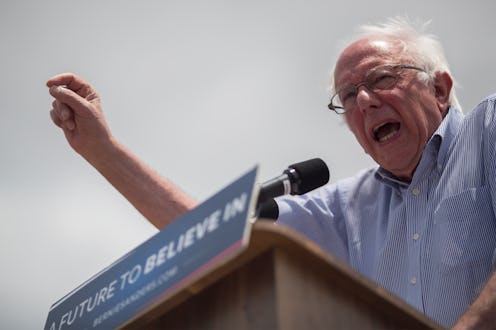News
The Week Bernie Sanders Stopped Being Cool
Several months ago, the Democratic primary was largely sleepy and non-eventful, while the Republican primary seemed poised to tear the party apart. Now, the situation has reversed itself. The Democratic party faces serious internal problems right now, and it's largely thanks to the conduct of one man: Bernie Sanders. This was the week Sanders stopped being cool and started becoming a threat to Democrats' chances of winning in November.
Tension between Sanders' camp and Democratic party leadership had been brewing for a while, but the powder keg exploded at the Nevada Democratic Convention on May 15. Sanders supporters felt that the state party's process for selecting delegates was unfair and biased against the Vermont senator, and let their grievances be known.
While it's still unclear precisely what went down in terms of the physical scuffles, the convention devolved into chaos, blew past its deadline by three hours and had to be shut down when security lost control of the event. Afterwards, the chair of the state party said that she received death threats from Sanders' supporters.
The problem — in addition, of course, to the alleged death threats — is that these claims of fraud and corruption by Sanders' voters simply weren't legitimate. Hillary Clinton defeated Sanders in the Nevada caucuses. She then turned out more supporters than he did at the state's numerous delegate conventions, and as a result, she came away with more delegates from the state.
Nevertheless, Sanders stood by his supporters; he released a statement claiming that "the Democratic leadership [in Nevada] used its power to prevent a fair and transparent process from taking place," adding fuel to the fire and confirming, to many of his supporters, that the process was rigged against them.
A few days later, Sanders said that he wouldn't support Democratic National Committee chairwoman Debbie Wasserman Schultz in her congressional reelection campaign, and will instead back her primary challenger. He also added that if he was elected president, he wouldn't reappoint Wasserman Schultz to head the DNC.
As this was unfolding, the Sanders campaign was publicly calling for Democratic superdelegates to get behind Sanders in order to help him close the significant pledged delegate gap between him and Clinton. It justified this on the grounds that polls show Sanders defeating Trump by larger margins than Clinton, and also, that Sanders won "the vast, vast majority of states at the end of the process."
But that justification completely ignores the fact that Clinton has received three million more votes than Sanders in the primaries; she's won more states than he has and has won more pledged (not super) delegates. There's no legitimate way to argue that the will of the people has been thwarted by the Democratic Party, because Democratic primary voters chose Clinton over Sanders.
And that, in a nutshell, is why Sanders' behavior recently has been so problematic. Despite his frequent claims that the Democratic Party is working against him, he is losing the nomination for completely fair, democratic reasons. As far as the primary process goes, it sure looks like Sanders and his supporters define a process as "fair" if it helps Sanders, and "rigged" if it doesn't.
Sanders' frequent claims that the process is working against him have turned his supporters harshly against Clinton, according to recent polls. One in four Sanders supporters say that they won't vote for Clinton if she wins the nomination, while 20 percent say they'll vote for Trump if Sanders isn't the Democratic nominee.
You could argue that a lot of these were independent voters who wouldn't have gone for Clinton in any situation. You could also argue that there's a long time between now and the election, and that Sanders' supporters will come out for Clinton once they're sufficiently terrified by Trump.
But Sanders has not helped the situation at all. Over the last week, he's encouraged the most conspiratorial and intellectually-devoid instincts of his supporters, and the Democratic party is starting to sustain damage because of the week Sanders lost his cool.
